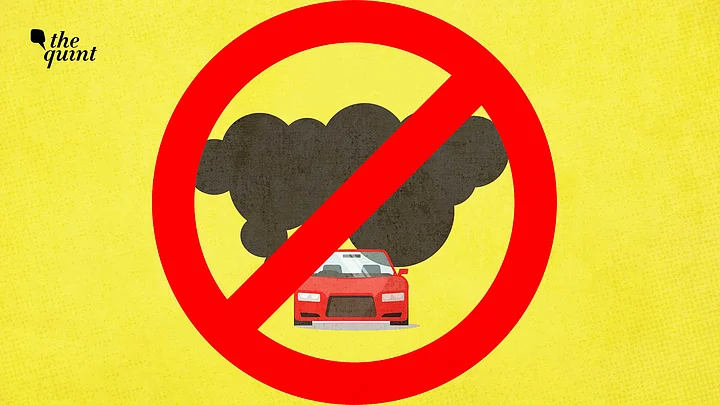With the Air Quality Index (AQI) in Delhi plunging to the 'severe +' category, the Delhi government has decided to implement the recommendations of the Commission for Air Quality Management (CAQM), which mandated that all petrol and diesel trucks, lorries, and commercial vehicles – except essentials and CNG vehicles – should not be allowed to enter the national capital.
On Friday morning, the AQI in Delhi stood at 472. In Noida and Gurugram, it was 562 and 593, respectively. Consequently, the government announced on Friday that primary schools in the capital would be closed from Saturday, 5 November. Chief Minister Arvind Kejriwal is also mulling "whether the odd-even scheme for vehicles should be implemented."
On Thursday, 3 November, the CAQM recommended that restrictions, mandated under Stage 4 (the final stage) of the Graded Response Action Plan (GRAP), be enforced to tackle pollution in the national capital. The GRAP is a set of anti-pollution measures followed in Delhi and its vicinity.
However, BS-VI vehicles and those used for essential and emergency services are exempted, according to an order issued by the panel.
But what measures does the Stage 4 action plan contain? What are BS-VI vehicles that have been exempted from the mandate? What else is banned and permitted under the GRAP Stage 4 action plan? The Quint explains.
What is the Stage 4 action plan under the GRAP?
There are four stages of the GRAP, which are meant to help combat air pollution. Each stage is implemented based on air quality.
* Stage 1 is when the air quality dips to 'poor' (201-300 AQI)
* Stage 2 is when the air quality touches 'very poor' (301-400 AQI)
* Stage 3 happens when the air quality sinks to 'severe' (401 to 450 AQI)
* Stage 4 is 'severe +' air quality, which is anything in excess of 450 on the AQI
Which vehicles have been banned and which have been exempted by the CAQM?
The CAQM has directed authorities to ban the plying of four-wheeler diesel light motor vehicles (LMVs) in Delhi and adjoining NCR districts and the entry of trucks into the capital. However, BS-VI vehicles and those used for essential and emergency services are exempted.
"A ban on plying of four-wheeler diesel light motor vehicles in NCT of Delhi and districts of NCR bordering Delhi, except BS-VI vehicles and vehicles used for essential/emergency services," the CAQM order read.
Vehicles run on electricity and CNG are, however, permitted.
What are BS-VI vehicles, which are exempted from the mandate?
The BS – Bharat Stage – emission standards are norms formulated by the Centre to regulate the output of air pollutants from internal combustion engine equipment, including motor vehicles.
BS-I emission norms were introduced in 2000 by the Central Pollution Control Board (CPCB) under the Union Ministry of Environment, Forests, and Climate Change. This was followed by BS-II in 2005, BS-III in 2010, and BS-IV in 2017. However, the widespread alarm raised over the highly deteriorating air quality in India forced the government to skip BS-V and move straight to BS-VI.
Under BS-VI, the sulphur content in vehicle fuel is slashed by a whopping five times to 10 PPM. For diesel model vehicles, the peak level of carbon monoxide emission should not exceed 0.50 g/kg.
In 2019, the Supreme Court directed car manufacturers to shift to BS-VI car models starting 1 April 2020.
How will the ban be implemented?
In all, 120 teams of the transport department will be in action at Delhi's entry points to ensure that trucks, apart from those carrying essential items, do not enter the national capital, officials told Moneycontrol.
As for enforcing the ban on the plying of four-wheeler diesel LMVs in the National Capital Territory (NCT) of Delhi, the official said they have access to a pan-India database through the 'Vahan' portal.
Officials added that vehicles will be forced to turn back, and if they manage to sneak in and are found plying on the roads of Delhi, they will be immediately impounded. The commission also ordered a ban on the Delhi-registered diesel-run medium and heavy goods vehicles in the capital.
(With inputs from Moneycontrol.)
(At The Quint, we question everything. Play an active role in shaping our journalism by becoming a member today.)
